PEP小学英语五年上册Unit2 A1-3
PEP人教版五年级上英语Unit2知识点、考点梳理精编

PEP人教版五年级上英语Unit2知识点、考点梳理精编1. 单词:- 早晨:morning- 午后:afternoon- 午饭:lunch- 过去的:past- 时间:time- 半:half- 分钟:minute- 再见:goodbye2. 词组:- 早晨好:Good morning- 午后好:Good afternoon- 午饭好:Good lunch- 三点半:half past three- 八点钟:eight o'clock- 七点五十分:ten minutes to seven- 再见:Goodbye3. 句型:- What's the time?(几点了?)- It's ______ o'clock.(几点了。
)4. 语法:- 表示时间的基本句型:It's ______ o'clock.- 以半或到为基准的表示时间的句型:It's half past ______. / It's ______ to ______. - 阴天:It's cloudy.- 多云:It's partly cloudy.- 多云转晴:It's cloudy turning fine.5. 对话:- A: What's the time?(现在几点了?)B: It's ______ o'clock.(现在几点了。
)6. 考点:- 掌握表达时间的词汇和句型;- 掌握询问时间的方式;- 熟练运用不同时间的表达方式;。
五年级上册pep英语2单元

五年级上册pep英语2单元
五年级上册PEP英语第二单元主要内容包括日常生活中的活动和习惯,以及相关的动词和短语。
这个单元通常涵盖以下内容:
1. 日常活动,学习如何描述日常活动,比如起床、吃早饭、上学、做作业等。
2. 动词和短语,学习一些常用的动词和短语,比如go to school(去学校)、have breakfast(吃早饭)、do homework(做作业)等。
3. 句型,学习如何运用所学的动词和短语构成简单的句子,比如"I get up at 7 o'clock."(我七点起床。
)。
4. 日常习惯,学习描述自己的日常习惯,比如喜欢做什么、不喜欢做什么,以及解释原因。
5. 听力和口语,通过听力练习和口语练习,学习如何正确地使用所学的词汇和句型。
在这个单元中,学生将通过课堂教学、练习册和课外阅读等方式来巩固所学的知识,从而提高他们的英语交流能力。
老师通常会通过教学活动和课堂作业来帮助学生掌握这些内容,以便他们能够在日常生活中运用所学的英语知识。
希望这些信息能够帮助你更好地了解五年级上册PEP英语第二单元的内容。
新版PEP五年级英语上册Unit1-2知识点总结-【2020年-2021年最新】

新版PEP五年级英语上册Unit 1-2知识点总结 -(姓名:_____ 班级:______)黑体的单词和句子要求听、说、读、写.其他部分的内容要达到熟读.Unit 1重点单词新版PEP五年级英语上册Unit 1-2知识点总结 -young 年轻的;岁数不大的funny 滑稽的;可笑的kind体贴的;慈祥的;宽容的strict 要求严格的;严厉的polite 有礼貌的;客气的shy 羞怯的;腼腆的;怕生helpful有用的;愿意帮忙的clever 聪明的;聪颖的hard-working工作努力的;辛勤的music 音乐art 美术science 科学English 英语maths/math 数学Chinese 语文;中文sometimes 有时;间或robot 机器人speak会说;会讲(某种语言);用(某种语言)说话新版PEP五年级英语上册Unit 1-2知识点总结 -1. —Who’s your art teacher? 谁是你的美术老师?—Mr. Jones.琼斯老师.2. —Is he young? 他年轻吗?—Yes, he is. 是的;他年轻. —No, he isn’t. 不;他不年轻.3. —What’s she like? 她怎样?—She’s kind. 他很和蔼.4. Ms Wang will be our new Chinese teacher. 王老师会成为我们的新语文老师.5. He is very helpful at home. 他在家很能干.6. Robin is short but strong. 罗宾个子矮;但是身体强壮.7. He can s peak Chinese and English. 他会说中文和英语.8. He makes me finish my homework. 他让我写作业.语音字母y在单词中的发音:1、双音节或多音节词末发[ i ].例:baby happ y windy sunny sorry candy many family party 婴儿开心的有风的晴朗的对不起糖果许多家庭聚会课外补充:2、y在单音节词末发[ ai ]例:by 乘坐my 我的why 为什么cry 哭fl y 飞重点知识及语法1、询问他人的外貌或性格:-What’s he/she like? - He/She is kind/…2、一般疑问句的问与答:—Is he/she…?—Yes, he/she is.—No, he/she isn’t.—Do you know…? —Yes, I do.—No, I don’t3、be动词的三种形式am, is, are与人称代词连用的用法:I + am,识记口诀:我用am, 你用are, is用于他、她、它;所有复数都用are.He, she, it;人名、物名+ isWe, you, they + are4、Ms., Miss, Mr., Mrs.的区别:Ms. [miz](缩略词)(用于女子的姓氏或姓名前;不指明婚否)女士;Miss [mis](用于未婚女子的姓氏或姓名前;以示礼貌)小姐;女士;Mr. [mist](mister的缩略词)(用于男子的姓氏或姓名前)先生;Mrs. [misiz](用于已婚女子的姓氏或姓名前)太太;夫人.5、and和but的区别:and “和;与”;表并列关系He is tall and thin. 他又高又瘦.but “但是”;表转折关系He is short but strong. 他个子矮;但是身体强壮.重点作文1、介绍自己、朋友或老师等熟悉的人物;如:My …teacher/friend/….思路导引(1)开头:交代人物的身份I have a/an…He/She is…He/She has …hair/eyes…(2)中间:1)体貌He/ She is tall/strong… 2)性格He/She is strict/kind…3)爱好 He/She likes playing pingi-pong/… 或He/She often read books/… on the weekend.(3)结尾:评价人物或抒发对人物的情感I like him/her very much.2、范文:(1)课本P9 Read and write(2)My Chinese teacherI have a new Chinese teacher. She is Ms. Chen. She is tall and thin. She has big eyes and long black hair. She is kind and funny. Sometimes she is strict, too. She is hard-working. She likes reading. Her class is so much fun. We all like her.Unit 2 重点单词新版PEP五年级英语上册Unit 1-2知识点总结 -Monday (Mon.) 周一Tuesday (Tues.) 周二Wednesday (Wed.) 周三Thursday (Thurs.) 周四Friday (Fri.) 周五Saturday (Sat.) 周六weekend 周末(周六、日)wash my clothes 洗衣服watch TV 看电视do homework 做作业read books 看书play football 踢足球on the weekend 在周末play sports/do sports做体育运动listen to music 听音乐play ping-pong 打乒乓球新版PEP五年级英语上册Unit 1-2知识点总结 -1. —What do you have on Thursdays? 星期四你们上什么课?—I have math, English and music. 我们上数学、英语和音乐课.2. —What do you do on Thursdays, Grandpa? 爷爷;星期四你要做什么?—I have a cooking class with your grandma. 我和你奶奶去上烹饪课.3. —Do you often read books in this park? 你经常在这个公园看书吗?—Yes, I do. 是的—No, I don’t.不是4. Look at my picture. 看我的图片.5. You look tired. 你看起来很累.6. You should play sports every day. 你应该每天做运动.语音字母组合ee, ea在单词中的的发音:[ i: ]例:fee t bee f mee t see fee d tea read eat repea t脚牛肉遇见看见喂养茶阅读吃重复注:1、ee组合绝大部分发长音[ i: ];只有少部分发短音[ i ];如:coffee 咖啡2、ea字母组合除了发[ i: ];还有可能发[ e ]等发音;如:bread 面包;或者发[ ei ];如:great 好极了重点知识及语法1、询问做什么事/活动:—What do you do …? —I often play ping-pong…询问星期几上什么课:—What do you have on…? —We have English c lass…2、一般疑问句的问与答:—Do you often read books? —Yes, I do. —No, I don’t.3、on+具体某一天(年月日;星期);如:on Monday/Tuesday…课外at+具体时刻(…点钟);如:at12 o’clock 在十二点整补充:in+大致时间(年月;早中晚);如:in2014 在2014年in the morning/afternoon/evening4、play + 球类、棋类、娱乐活动;如:play football/ping-pong补充:play + the + 乐器(第四单元知识);如:play the pipa/piano/violin… 重点作文1、描写一周的生活;如:My week思路导引(1)开头:简单的自我介绍:My name’s…/ I’m… (2)中间:1)介绍周一至周五的情况;可以着重介绍自己最喜欢的那一天:because I have…I go to school from Monday to Friday. I like…2)介绍自己周六、日的活动:I often watch TV/…on the weekend.(3)结尾:This is my week. What about yours?2、范文:My weekMy name is Li Ming. I go to school from Monday to Friday. I like Tuesdays and Thursdays, because I have music and PE. I often do my homework and read books on Saturdays. I often play ping-pong on Sundays.Unit 3重点单词新版PEP五年级英语上册Unit 1-2知识点总结 -hamburger 汉堡包tea 茶sandwich 三文治salad 沙拉fresh 新鲜的;刚摘的healthy 健康的delicious 美味的;可口的hot 辣的;辛辣的sweet 含糖的;甜的hungry 饿的thirsty 渴的;口渴的favourite 特别喜爱的food 食物drink 喝;饮carrot 胡萝卜chicken 鸡肉onion 洋葱milk 牛奶bread 面包beef noodles 牛肉面fish sandwich 鱼肉三明治tomato soup 西红柿汤新版PEP五年级英语上册Unit 1-2知识点总结 -1.—What would you like to eat? 你想吃什么?—A sandwich, please. 请给我一个三明治.—What would you like to drink? 你想喝什么?—I’d like some water. 我想喝点水.2. —What’s your favourite food?你最喜欢吃什么食物?—Noodles. They are delicious. 面条.面条很好吃.3. My/His /Her favourite food is fish. 我/他/她最喜欢的食物是鱼.4. I’m hungry/thirsty. 我饿/渴了.5. I don’t like beef but chicken is OK. 我不喜欢牛肉但是鸡肉也可以.6. Onions are my favourite vegetable. 洋葱是我最喜欢的蔬菜.7. I like vegetables but not carrots. 我喜欢吃蔬菜但不喜欢胡萝卜.语音字母组合ow在单词中的发音:[ au ] ;[例:[ au ] cow奶牛flow er 花wow哇dow n 向下how如何;怎样now现在[slow慢的snow雪yellow黄色window窗户snow y 下雪的tomorrow明天重点知识及语法1、询问想要吃/喝什么:—What would you like to eat/drink? —I’d like…2、询问最喜欢的事物:—What’s your favourite food/vegetable/…? —My favourite food/…is…/I like…3、名词复数的规则变化:(1)直接加s;(2)以s, x, sh, ch结尾的;加es;如;bus es box es sandwich es(3)以o结尾;有生命的加es;如;potato es tomato es无生命的加s;如;photo s piano s zoo s补充:(4)以辅音加y结尾;改y为i再加es;如;famil ies bab ies以元音加y结尾;直接加s;如;boy s day s(5)以f或fe结尾;改f为v再加es;如knife-kni ves小刀leaf-lea ves树叶4、some+可数/不可数名词例:some apple s(可数)some water/rice/juice/bread/…(不可数)课外补充:不可数名词(词后不可以加-s/es;所接动词用单数is /V-s/es)液体water milk tea orange(桔汁)coke juice气体air(空气)食物food rice bread fruit肉类meat(肉)fish beef chicken物质work(工作)paper(纸)time music weather(天气)snow money重点作文1、描述自己和家人最喜爱的食物思路导引(1)开头:简单介绍自己的家庭成员:There are…people in my family. They are…(2)中间:分别介绍每个家庭成员最喜爱的食物时什么:…favourite food is…/…is…favourite./…like(s)…best.(3)结尾:穿插说明喜欢的原因:It’s/They’re…2、范文:(1)课本P29 Read and write(2)There are four people in my family. They are my parents, my brother and me. My mother likes saladbest. It’s fresh. Beef is my father’s favourite. He thinks(认为)it’s delicious. My brother likes ice cream. It’s sweet. My favourite food is fish. It’s very healthy.Unit 4重点单词新版PEP五年级英语上册Unit 1-2知识点总结 -sing English songs 唱英文歌曲play the pipa 弹琵琶do kung fu 打功夫draw cartoons 画漫画swim 游泳speak English 说英语cook 烹饪;烹调play basketball 打篮球play ping-pong 打兵乓球draw pictures 画画clean the classroom 打扫课室新版PEP五年级英语上册Unit 1-2知识点总结 -1. We’ll have an English party next Tuesday! 我们下周二将举行英语派对.2. —What can you do for the party? 你能为派对做些什么呢?—I can sing English songs. 我能唱英文歌.3. How/What about you? 你呢?4. Can you do any kung fu? 你会打功夫吗?—Yes, I can. 是的;我会. —No, I can’t. 不;我不会.5. No problem. I can help you. 没问题.我会帮你.6. I can play ping-pong, but I can’t swim. 我会打乒乓球;但我不会游泳.7. Please send me an email at robin@. 请给我发邮件;邮箱robin@.语音字母组合oo在单词中的发音:[ u ];[ u: ]例:[ u ] loo k 看goo d 好的boo k 书coo k 烹饪woo d 木头foo t 脚助记口诀: 1. 看look好good书book;砍柴wood做饭cook洗脚foot.2. 押韵记忆:Look good book, cook wood foot.[ u: ] ball oo n 气球foo d 食物zoo动物园noo dles 面条注:字母组合oo发音少数发短音[ u ];多数发长音[ u: ] .重点知识及语法1、询问对方会做什么事情:—What can you do? —I can play the pipa.2、can句型的否定句:I can’t play the pipa.3、can句型的一般疑问句的问与答:—Can you do any kung fu? —Yes, I can./No, I can’t.4、play + the + 乐器;例play the erhu /pipa /piano…play + 球类、棋类、娱乐活动;例play basketball/football/ping-pong…5、some与any的异同:相同之处:都有“一些”的含义;不同之处:some+可数名词复数/不可数名词(用于肯定句中)例:I can do some kung fu. 我会打功夫.any+可数名词复数/不可数名词(用于否定句或疑问句中)例:I can’t do any kung fu. 我不会打功夫. Can you do any kung fu? 你会打功夫吗?课外补充:1)any还可以用于肯定句;作“任何的”解.例:Any student can answer this question. 任何学生都能回答这个问题.2)在表示建议;请求的疑问句中;或期望得到肯定回答时;用some而不用any.例:Would you like some coffee? 你想来点咖啡吗?重点作文1、描写自己或家庭成员会做的事情;如:I’m helpful / Super family;思路导引(1)开头:介绍自己或家庭成员的基本情况:I’m… I’m…years old.I have a super family. There are three people in my family. They are…(2)中间:介绍自己在家和在学校里会做的事情/介绍家人的外貌性格以及会做的事情:I can…at school. I can…at home.My father is strong. He can do some kung fu. My mother is…She can…(3)结尾:总结This is me. What can you do?This is my family. I love my family. Can you tell me your family?/What about your family?2、范文:(1)课本P43 Read and write(2)Hello, I’m Zhao Ming. I’m eleven years old. I’m helpful. I can clean the windows and sweep the floorat school. I can cook and wash my clothes at home.I often play the pipa on the weekend. I can play basketball. I like English very much. I can speakEnglish well. What can you do?Unit 5重点单词新版PEP五年级英语上册Unit 1-2知识点总结 -photo 照片;相片plant 植物water bottle 水瓶bike 自行车;脚踏车in front of 在……前面beside 在旁边(附近)between 在……中间behind 在(或向)……后面above 在(或向)……上面so many 许多their 他们的lots of 许多dirty 肮脏的near 在附近house 房屋;房子;住宅新版PEP五年级英语上册Unit 1-2知识点总结 -1. Your room is really nice! 你的房间真漂亮!2. There is a big bed. 有一张床.3. 我的电脑在书桌这里.4. This is my room. 这是我的房间.5. There are so many picture s here. 这有许多照片.6. My father can draw very well. 我父亲画的很好.7 .—Where is the ball? 球在哪里?—It’s in front of the dog. 在狗的前面.8. There is a tree in front of the house. 在房子前有棵树.9. I live near the nature park. 我住在自然公园附近.语音字母组合ai, ay在单词中的发音:[ ei ]例:rai ny 下雨的rai nbow 彩虹pai nt 涂色wait 等待say说way路;方法birthd ay生日Mond ay周一day天;日子tod ay今天may可以课外补充:元音字母a在开音节中也发[ ei ] 例:cake 蛋糕face 脸name 名字重点知识及语法1、there be(is, are)句型的单复数形式:There is a clock. There are lots of flower s.课外补充:(1)There be句型的动词就近原则:例:There is a bed, a desk, two photos in my room.There are two photos, a bed and a desk in my room.(2)there be与have/has的异同:相同之处:都有“有”的含义不同之处:there be表示“某地有……”(无生命的);主语放在句末;例:There is a book on the desk. 书桌上有一本书.have/has表示“某人有……”(有生命的);放在主语(人)的后面.例:I have a book. 我有一本书.2、询问方位或地点:—Where is the ball? —It’sin front of the dog.3、lots of + 可数/不可数名词= a lot of + 可数/不可数名词“许多……”比较:many + 可数名词复数“许多……”例:There are many tree s in the forest.much + 不可数名词“许多…....”例:I drink much water every day. 我每天喝很多水.4、动词+very well例:My father can draw very well我爸爸画的很好比较:be (am/is/are)+very good例:The book is very good. 这本书非常好.重点作文1、描写房间、卧室;如:My room / bedroom;思路导引(1)开头:总体概括自己卧室的特征I have a nice/big/clean/…room.(2)中间:描述卧室里的物品、摆设There is/are….on/beside/…… is on the desk/….(3)结尾:抒发对卧室的情感I like/love my bedroom (very much)! Can you tell me yours?2、范文:(1)课本P53 Read and write(2)My bedroomI have a nice bedroom. It’s not big but clean.I like my bedroom. Can you tell me yours?Unit 6重点单词新版PEP五年级英语上册Unit 1-2知识点总结 -hill 山丘;小山river 河;江mountain 高山;山岳lake 湖;湖泊village 村庄;村镇house 房屋;房子;住宅tree 树;树木;乔木bridge 桥go boating 去划船nature park 自然公园people 人;人们rabbit 兔子duck 鸭子animal 动物high 高的children 孩子们(child的复数形式)新版PEP五年级英语上册Unit 1-2知识点总结 -1. Children, let’s go to the forest. 孩子们;让我们去森林吧.2. —Is there a river in the forest? 森林里有河流吗?—Yes, there is.是;有的. —No, there isn’t.不;没有.3. The nature park is so quiet! 自然公园这么安静!4. There aren’t many people. (这里)人不多.5. —Are there any tall building s in the nature park? 自然公园例有高楼吗?—Yes, there are.是;有的. —No, there aren’t.不;没有.6. —How many? 多少? —Two. 两个.7. Robin is at Mr. Jones’ house. 罗宾在琼斯先生的房子里.语音字母组合ou在单词中的发音:[ au ]例:hou se 房屋;房子mou se 老鼠sou nd 声音;听起来cou nt 数数提示:字母组合ow也有些发[ au ];例:cow奶牛how如何;怎样dow n 向下课外补充:字母组合ou在单词中还可读[ u: ];如sou p 汤grou p 群;团体;和[ ;如you ng 年轻的.重点知识及语法1、there be句型的一般疑问句的问与答:—Is there a lake? —Yes, there is. —No, there isn’t.—Are there any animal s? —Yes, there are. —No, there aren’t. 2、there be(is, are)句型的单复数形式(具体见Unit 5的重点知识及语法):例:There is a nature park near the house. There are many duck s on the lake.3、some与any在肯定句、否定句及问句中的用法:some+可数名词复数/不可数名词(用于肯定句中)例:There are some books on the desk.any+可数名词复数/不可数名词(用于否定句或疑问句中)例:There aren’t any people in the forest.Are there any tall buildings in the natures park?4、people人;人们(集体名词;明为单数;实为复数;词末不能加-s)例:There are many people in the park.重点作文1、描写景物;如:看图作文(风景图)思路导引(1)开头:Look at the picture.(2)中间:用There is/are…beside/in front of…句型描述图中所有的景物及其位置;注意要有明确的观察主线;即观察的顺序性与条理性.2、范文:(1)课本P63 Read and write(2)看图作文Look at the picture. This is a beautiful village. There are three houses in thepicture. There are many trees near them. In front of the houses, there is a river.The bridge is over the river. Behind the houses, there is a forest and a mountain.。
新pep人教版五年级英语上册第一二三单元知识点

新pep人教版五年级英语上册第一二三单元知识点2022新pep人教版五年级英语上册第一二2022新人教版小学五年级上册第一单元知识点Unit1What’helike 一.单词1.形容人的形容词新词:young年轻的old年老的kind和蔼的trict严格的funny滑稽可笑的clever聪明的polite有礼貌的helpful乐于助人的hy害羞的hard-working努力工作(学习)的复习:tall高的hort矮的trong强壮的fat胖的thin瘦的mart聪明的active积极的、活跃的quiet安静的、文静的nice好的lovely可爱的2.称呼用词:先生女士(未婚)M女士(不明是否已婚)Mr夫人(随丈夫姓)3.频率词:often经常uually通常有时4.任课教师anartteacher一位美术老师anEnglihteacher一位英语老师amathteacher一位数学老师aacher一位科学老师aacher一位语文老师amuicteacher一位音乐老师aPEteacher一位体育老师二.句型1.Who’your()teacher谁是你的()老师?Mr…...某先生…...某女士(未婚)。
M……..某女士(不明是否已婚)。
…….某夫人(随丈夫姓)。
括号里填科目2.问:What’()like某人怎么样?括号里可填:(he/he/yourfather/yourartteacher/ZhangPeng/MrLi)答He/Shei().括号里填描述人的形容词WangwillbeournewEnglihteacher.王女士将会是我们的新英语老师。
4.Ihe/hekind她是和蔼的吗?肯定回答Ye,he/hei.否定回答No,he/hein’Do youknowMrYoung你知道杨先生吗?肯定回答:Ye,Ido.否定回答:No,Idon’三.句型变换d.(变为疑问句)Id2ung.(对划线部分提问)What’Mikelike3.Iknow.(变为否定句)Idon’tknow.四.be动词的用法I→amIamhelpfuluYouadlweareWeagTheyareold.itItimallHeifud.四.字母y在单词结尾发音[I]happybabyunnywindanycandypartyfamilyclachedule课程表weekenddayTuedayWednedayThurdayFridaySaturdaySundagglaglaath mathmaaathmoraleducaglihartaPPglathmuicmoraleducauicart学校课程maathmathmath2022新人教版小学五年级上册第二单元知识点Unit2Myw一.单词二.1.星期:Monday星期一Tueday星期二Wedneday星期三Thurday 星期四Friday星期五Saturday星期六Sunday星期天week一周weekend 周末weekday工作日day天烹饪gcladule时刻表clachedule课程表4.短语:dohomework做作业watchTV看电视readbook读书wahmyclothe洗我的衣服playfootball踢足球layping-pang打篮球playbaketball打篮球la做运动plaa弹琵琶drawpicture画画lea打扫房间dohouework做家务luic听音乐二.句型Whatdaday今天星期几?It’Tueday.星期二。
新pep人教版五年级英语上册第一二三单元知识点

新 pep 人教版五年级英语上册第一二三单元知识点2014 新人教版小学五年级上册第一单元知识点Unit 1 What ’s he like ?一.单词1.形容人的形容词新词: young 年青的 old年迈的kind平和的strict 严格的 funny 风趣可笑的 clever 聪慧的 polite 有礼貌的 helpful 乐于助人的 shy 害羞的 hard-working努力工作(学习)的复习:tall高的short矮的strong强健的fat胖的 thin瘦的smart聪慧的active踊跃的、活跃的quiet寂静的、娴静的nice好的lovely可爱的2.称号用词 : 先生女士(未婚) Ms女士(不明能否已婚) Mrs 夫人(随丈夫姓)3.频次词: often 常常 usually 往常有时4.任课教师an art teacher一位美术老师an English1 / 9teacher一位英语老师a maths teacher一位数学老师aacher一位科学老师aacher一位语文老师 a music teacher一位音乐老师a PE teacher一位体育老师二.句型1.Who’s your ( )teacher ?谁是你的()老师?Mr ...某先生。
...某女士(未婚)。
Ms..某女士(不明能否已婚)。
.某夫人(随丈夫姓)。
括号里填科目2 .问:What’s ( ) like ?某人怎么样?括号里可填:(she/he/your father/your artteacher/Zhang Peng/Mr Li)答 He /She is ( ) .括号里填描绘人的形容词Wang will be our new English teacher .王女士将会是我们的新英语老师。
4.Is she/he kind ?她是平和的吗?一定回答Yes,she/he is .否认回答No ,she/he isn’Do you2 / 9know Mr Young ? 你知道杨先生吗?一定回答:Yes ,I do . 否认回答: No ,I don’三.句型变换 d .(变成疑问句 )Id ?2ung .(对划线部分发问)What’s Mike like ?3.I know .(变成否认句) I don’t know .四. be动词的用法I→ am I am helpfulu You adlwe are We agTheyare old .it It is smallHe is fud .四.字母 y 在单词结尾发音[ I ]happy baby sunny windany candy party familyclasss chedule课程表weekenddayTuesdayWednesdayThursdayFridaySaturdayS undagglaglaathsmathsmaaathsmoral educaglishart aPPglathsmusicmoral educausicart学校课程maathsmathsmaths2014 新人教版小学五年级上册第二单元知识点Unit 2 My w一.单词二. 1. 礼拜: Monday 礼拜一 Tuesday 礼拜二Wednesday 礼拜三 Thursday 礼拜四 Friday礼拜五3 / 9Saturday 礼拜六 Sunday 礼拜天 week 一周 weekend 周末weekday 工作日 day 天烹调 g cladule时刻表classs chedule课程表4. 短语: do homework 造作业 watch TV看电视read books念书wash my clothes洗我的衣服play football踢足球 lay ping-pang打篮球play basketball打篮球la 做运动 plaa弹琵琶draw pictures画画lea打扫房间do housework做家务lusic听音乐二.句型 What daday ?今日礼拜几?It ’s Tuesday. 礼拜二。
人教版PEP英语五年级(上)Unit2(含视频、翻译、知识点、练习)
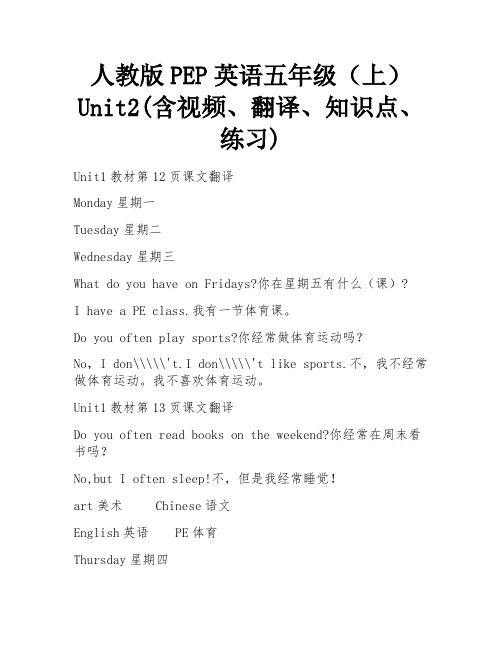
人教版PEP英语五年级(上)Unit2(含视频、翻译、知识点、练习)Unit1教材第12页课文翻译Monday星期一Tuesday星期二Wednesday星期三What do you have on Fridays?你在星期五有什么(课)?I have a PE class.我有一节体育课。
Do you often play sports?你经常做体育运动吗?No,I don\\\\\'t.I don\\\\\'t like sports.不,我不经常做体育运动。
我不喜欢体育运动。
Unit1教材第13页课文翻译Do you often read books on the weekend?你经常在周末看书吗?No,but I often sleep!不,但是我经常睡觉!art美术Chinese语文English英语PE体育Thursday星期四Friday星期五Saturday星期六Sunday星期日Unit2教材A部分课文翻译1Let\\\\\'s try部分翻译Listen and fill in the blank.听一听并填空。
What do you have on Wednesdays?你在星期三有什么(课)?I have____.我有____。
art美术Chinese语文English英语PE体育Wednesday星期三Grandfather:Good morning,John.What day is it today?(外)祖父:早上好,约翰。
今天星期几?John:Wednesday.约翰:星期三。
Grandfather:Oh,yes! What do you have on Wednesdays?(外)祖父:哦,是的!你在星期三有什么(课)?John:I have art.I really like it.约翰:我有美术(课)。
我真的喜欢它。
2Let\\\\\'s talk部分翻译John:Grandpa!Look at my picture.约翰:(外)祖父!看我的照片。
PEP版小学英语五年级上册知识点汇总(全一册)
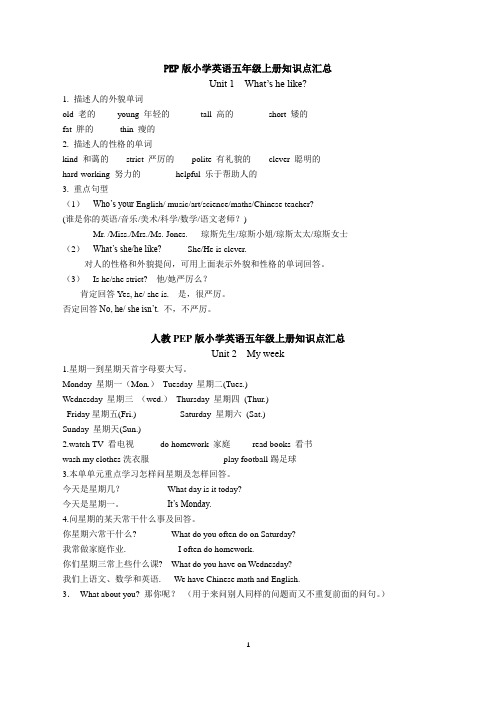
PEP版小学英语五年级上册知识点汇总Unit 1 What’s he like?1. 描述人的外貌单词old 老的young 年轻的tall 高的short 矮的fat 胖的thin 瘦的2. 描述人的性格的单词kind 和蔼的strict 严厉的polite 有礼貌的clever 聪明的hard-working 努力的helpful 乐于帮助人的3. 重点句型(1)---Who’s your English/ music/art/science/maths/Chinese teacher?(谁是你的英语/音乐/美术/科学/数学/语文老师?)---Mr. /Miss./Mrs./Ms. Jones. 琼斯先生/琼斯小姐/琼斯太太/琼斯女士(2)---What’s she/he like? ---She/He is clever.对人的性格和外貌提问,可用上面表示外貌和性格的单词回答。
(3)---Is he/she strict? 他/她严厉么?肯定回答Yes, he/ she is. 是,很严厉。
否定回答No, he/ she isn’t. 不,不严厉。
人教PEP版小学英语五年级上册知识点汇总Unit 2 My week1.星期一到星期天首字母要大写。
Monday 星期一(Mon.)Tuesday 星期二(Tues.)Wednesday 星期三(wed.)Thursday 星期四(Thur.)Friday星期五(Fri.) Saturday 星期六(Sat.)Sunday 星期天(Sun.)2.watch TV 看电视do homework 家庭read books 看书wash my clothes洗衣服play football踢足球3.本单单元重点学习怎样问星期及怎样回答。
今天是星期几?What day is it today?今天是星期一。
It’s Monday.4.问星期的某天常干什么事及回答。
新版pep五年级上册Unit1-3知识点整理
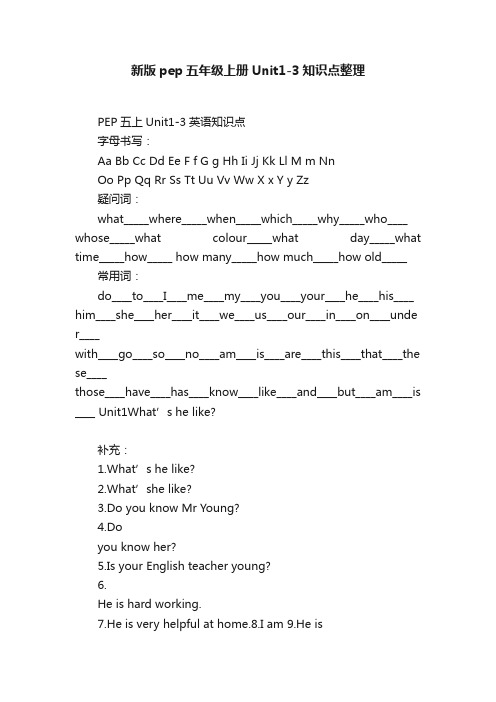
新版pep五年级上册Unit1-3知识点整理PEP五上Unit1-3英语知识点字母书写:Aa Bb Cc Dd Ee F f G g Hh Ii Jj Kk Ll M m NnOo Pp Qq Rr Ss Tt Uu Vv Ww X x Y y Zz疑问词:what_____where_____when_____which_____why_____who____ whose_____what colour_____what day_____what time_____how_____ how many_____how much_____how old_____ 常用词:do____to____I____me____my____you____your____he____his____ him____she____her____it____we____us____our____in____on____unde r____with____go____so____no____am____is____are____this____that____the se____those____have____has____know____like____and____but____am____is ____ Unit1What’s he like?补充:1.What’s he like?2.What’she like?3.Do you know Mr Young?4.Doyou know her?5.Is your English teacher young?6.He is hard working.7.He is very helpful at home.8.I am 9.He is10.She is11.You are 12,We are13.They are14.Mr15.Miss16.Mrs17.Mrs Wang will be our Chinese teacher.18.She’s the head teacher.19.He can speak Chinese and English.20.Robin is short but strong.am is are完全形式缩写形式I am I’m he is he’s she is she’s it is it’s we are we’re they arethey’re字母书写:Aa Bb Cc Dd Ee F f G g Hh Ii Jj Kk Ll M m NnOo Pp Qq Rr Ss Tt Uu Vv Ww X x Y y ZzYes/No疑问句:1.Is it Friday?2.Is it cold in Mile?3.Is it a cat?4.Is this a pear?5.Is that a strawberry?6.Are they on the table?7.Do you like apples?8.Do you know Mr Zhang?9.Do you often read books?10.Do you like it?Unit2:My week星期一Mon.星期二Tues.星期三Wed.星期四Thur.星期五Fri.星期六Sat.星期日Sun.缩略加上day,合并即成周一至周日。
人教版pep英语五上各单元重点知识

人教版pep英语五上各单元重点知识1. Unit 1: Hello!In this unit, students will learn basic greetings, classroom language, and numbers. They will also be introduced to the topic of countries and nationalities. Through various activities and exercises, students will be able to practice speaking, listening, and reading in English. It is important for students to master these basic greetings and numbers as they form the foundation for further language acquisition.2. Unit 2: My School DayThis unit focuses on daily routines and telling the time. Students will learn how to talk about their daily schedule and activities, as well as tell the time using both digital and analog clocks. It is essential for students to understand and be able tomunicate about their daily routines as it is a fundamental aspect ofmunication.3. Unit 3: At the FarmIn this unit, students will learn about farm animals, their habitats, and the sounds they make. They will also be exposed to simple adjectives to describe the animals. It is crucial for students to understand the vocabulary related to farm animals as it expands their knowledge of the world around them.4. Unit 4: Food and DrinksThis unit introduces students to various types of food and drinks. They will learn vocabulary related to different meals, fruits, and beverages. Understanding this vocabulary is important for students as it enables them to express their preferences and make choices when ites to food and drinks.5. Unit 5: Let's CelebrateIn this unit, students will learn about different celebrations and festivals around the world. They will be exposed to vocabulary related to celebrations and traditions. It is important for students to learn about different cultures and traditions as it promotes cultural awareness and understanding.6. Unit 6: Our ClothesThis unit focuses on clothing and the weather. Students will learn vocabulary related to different types of clothing and how to describe the weather. This knowledge is important for students as it allows them to talk about their clothing preferences and the weather conditions in their daily lives.In conclusion, the key knowledge and skills covered in the first five units of the People's Education Press (PEP) English textbook for fifth grade are essential for students to develop a solid foundation in English language learning. Mastering these units will enable students tomunicate effectively and confidently in various everyday situations. It is important for students to continue practicing and reinforcing these skills in order to build upon their English proficiency.My personal understanding of these key knowledge points is that they form the building blocks for students' language acquisition. Each unit introduces new vocabulary, grammar structures, and cultural knowledge that contribute to a holistic language learning experience. It is crucial for students to grasp these concepts in order to progress to more advanced language skills in the future.Overall, the curriculum in the PEP English textbook for fifth grade provides aprehensive and well-structured approach to English language learning. By focusing on practical and applicable language skills, it equips students with the necessary tools tomunicate effectively in real-life situations. I believe that this early exposure to English language and culture will greatly benefit students in their future academic and professional endeavors.This article is not only a guide for me but for all the fifth-grade students who are using the PEP English textbook. I hope that it serves as a helpful resource for understanding and mastering the key knowledge and skills presented in the textbook.。
新人教版PEP五年级英语上册各单元重点知识归纳

新人教版PEP五年级英语上册各单元重点知识归纳Unit 1: Hello!- Greetings: Hello, Hi, Good morning, Goodbye- Introducing oneself: My name is..., I'm..., Nice to meet you- Numbers: 1-20- Classroom objects: desk, chair, book, pen, pencil, rulerUnit 2: My Schoolbag- Stationery items: eraser, pencil sharpener, glue, crayons, scissors - Colors: red, blue, green, yellow, black, white- Personal pronouns: I, you- Plural forms of nouns: pens, pencils, rulers, booksUnit 3: My Friends- Adjectives: happy, sad, tall, short, thin, fat- Describing appearance: He/She is..., They are...- Possessive adjectives: my, your, his, her, their- Talking about friends: I have a friend. His/Her name is... Unit 4: My Home- Rooms in a house: living room, bedroom, kitchen, bathroom - Prepositions: in, on, under, near- Furniture: sofa, bed, table, chair- Demonstrative pronouns: this, that, these, thoseUnit 5: Food and Drinks- Food items: apple, banana, orange, sandwich, hamburger- Drinks: water, milk, juice, tea- Expressing likes and dislikes: I like..., I don't like...- Question words: What, Where, WhoUnit 6: At the Market- Fruit: grapes, strawberries, watermelon, pineapple- Vegetables: carrot, tomato, onion, potato- Countable and uncountable nouns: an apple, some bananas, a glass of milk- Shopping phrases: How much is..., I want...Unit 7: In the Park- Outdoor activities: play football, fly a kite, ride a bicycle- Weather: sunny, rainy, windy- Present continuous tense: I am playing, He is running- Adverbs: slowly, quicklyUnit 8: My Family- Family members: father, mother, brother, sister- Describing relationships: This is my..., He/She is my...- Possessive 's: Dad's book, Mom's bag- Expressing family activities: We have dinner, We go swimmingUnit 9: At the Zoo- Animals: panda, lion, elephant, giraffe, monkey, tiger- Describing animals: big, small, tall, short, fast, slow- Present simple tense: Lions eat meat, Monkeys swing on trees - Plural forms of animals: pandas, monkeys, tigersUnit 10: At the Farm- Farm animals: cow, horse, pig, chicken, goat- Animal sounds: moo, neigh, oink, cluck, baa- Expressing abilities: I can..., He/She can...- Prepositions of location: in front of, behindUnit 11: Nature Park- Nature elements: river, tree, flower, grass, mountain- Adverbs of frequency: always, usually, sometimes, never- Asking about preferences: Do you like..., Which do you like...Unit 12: Let's Celebrate!- Festivals: Christmas, Spring Festival, Easter, Halloween- Activities during festivals: decorate, light candles, give gifts - Recounting past events: Last year, I..., We...。
PEP五年级英语上册Unit 2 Part A 第3课时
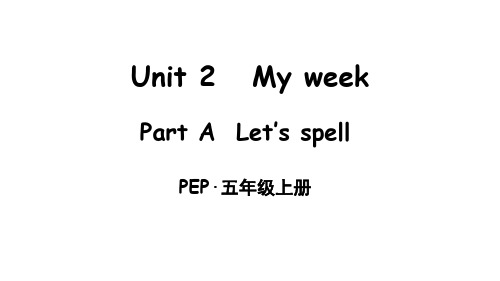
Read and act
Read the words.
geese three creek cheese breeze tea
Blackboard design
Unit 2 My week read tea eat feet beef meet
ea
ee
/ i: /
Homework
1. Read the words in “Let’s spell” to your parents.
What can you find out?
read
tea
eat
ea / i: /
Do you like to repeat?
Now, please repeat this chant after the recording!
Let’s chant
What’s this? foot
What are they? feet
Let’s chant
Lead-in
Guess the pronunciation.
ee
ea
Do you like to read? I like to read.
Do you like to eat? Yes, I like to eat.
Do you like to drink tea? Yes, I like to drink tea.
_Fe_e_d_ the baby.
Read the sentences.
1. I like to read by the sea. 2. Have some beef and tea. 3. Feed the baby.
Choose one sentence from above and write. _________________________________
新版PEP五年级英语上册Unit2(1-3课时)教案

Unit2 My week 第1课时一. 教学内容:Main scene, A.Let’s try & Let’s talk二. 教学目标:1. 能够正确听说朗What do you have on Thursdays? I have maths, English and music.等句型。
2.能够正确听说读单词:weekend, Sunday, Monday, Tuesday, Wednesday, Thursday, Friday, Saturday;认读相关学科的单词,如PE, music, art, Chinese, English 等,以及动词词组:read books等。
3.能够听懂会说会表演对话内容,并在真实情境中运用所学语言进行真实交流。
4. 在对话交流中使学生养成用英语交流的习惯,培养良好的语音语调和语感。
三.教学重点难点重点:学生能够表演对话交际内容,能够在情境中询问别人的课程安排以及回答。
难点:1.单词Wednesday, Tuesday, Thursday, Saturday的拼写。
2.熟练运用句型:What do you have on…? I hav e…三. 教学准备: 课件、卡片、录音机。
四. 教学过程Step1 Warming up1. Greetings: Hello, boys and girls. How are you today? Today we have a guest, c an you guess? 引出Feynman(吴镇宇儿子, 见<<爸爸去哪儿>>第2季), 告诉学生他来了解我们的学习生活。
2. Let’s sing: “Days of the week. ”Feynman给我们带来一首歌,让我们去听一听。
Monday, Tuesday, Wednesday, Thursday, Friday, Saturday, Sunday, Days for sch ool and days for fun. Happy days for everyone!3. Listen and do.教师发给学生印有星期几的单词卡片,教师说单词,学生快速反应起立。
人教PEP版英语五年级上册五上Unit2PartA第三课时课件
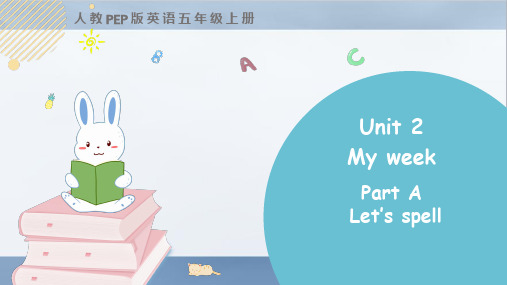
字母组合ea还可以发/e/音:
如:weather(天气), bread(面包), sweater(毛衣), head(头), breakfast(早餐)等。
Exercises
一、按正确顺序写出下列单词。 1. e r a d 2. t e m e 3. d e f e
Summary
字母组合
ee ea
发音
词语
七彩课堂 /i:/
meet feet see feed beef
伴你成长 /i:/
read tea eat repeat
Homework
one
two
七彩课堂 听、跟读Read,
listen and chant.
写五组字母组合ee与 ea发/i:/音的单词。
1 meet feet read
2 see tea eat
3 feed repeat beef
1 meet feet read
2 see tea eat
3 feed repeat beef
meet
} feet
see
ee
feed
beef
/i:/
} read
tea eat
ea
repeat
/i:/
Listen, write and say Listen and fill in the blanks.
Read, listen and chant
feet beef meet tea read eat
} }
Watch and follow.
feet
ee /i:/ beef
meet
- 1、下载文档前请自行甄别文档内容的完整性,平台不提供额外的编辑、内容补充、找答案等附加服务。
- 2、"仅部分预览"的文档,不可在线预览部分如存在完整性等问题,可反馈申请退款(可完整预览的文档不适用该条件!)。
- 3、如文档侵犯您的权益,请联系客服反馈,我们会尽快为您处理(人工客服工作时间:9:00-18:30)。
Look and write.
1._W__h_a_t _d_o_y_o_u__h_a_v_e__on Thursdays? I have maths,English and music.(对划线部分提问) 2. _W__h_a_t _d_o_ _y_o_u__d_o___on Thursdays? I have a cooking class with your grandma .(对划线部分提问) 3.do you do what on Thursdays (?) (连词成句) _W__h_a_t__d_o_y_o_u__d_o__o_n__T_h_u_r_s_d_a_y_s_. __ 4._W__h_o_'_s _y_o_u_r_ music teacher?Mr Young. (对划线部分提问) 5.Is he strict?(变陈述句)_H_e__is_s_t_r_ic_t_._________
星期一 Mon+day 忙 day 星期二 Tues+day 求死day 星期三 Wednes+day 未死day 星期四 Thurs+day 受死day 星期五 Fri+ day 福来day 星期六 Satur+day 洒脱day 星期日 Sun+day 伤day
爷爷!看我的画。 好极了!你星期四有什么课?
Look and write
1. Look at_m__y_(I) picture. 2.Who__is_(be) your musice teacher? 3.He is _f_u_n_n_y_(fun). 4.I have a _c_o_o_k_in_g_(cook) class _w_i_th__(和…一起) yuor grandma.
ee组合只发长音[i:],=e的开音节音
beef
feetmeຫໍສະໝຸດ tea组合也经常读长音[i:]
有时也常读[e],如:
tea
read
eat
head bread
我有数学,英语和音乐课。
哦,我喜欢音乐!你们的音乐老师是谁啊? 杨老师 他严厉吗?
不,他很有趣。星期四您做什么,爷爷?
我和你奶奶有烹饪课。 哈哈!
Look and order. ( 2 )Really? ( 5 )What's in your schoolbag? ( 1 ) Hi, Chen Jie.I have a new schoolbag. ( 4 )Wow! It's a panda! ( 7 )It's a fat panda! ( 6 )An English book, a maths book, three storybooks and …. ( 3 )Look! It's black and white.
